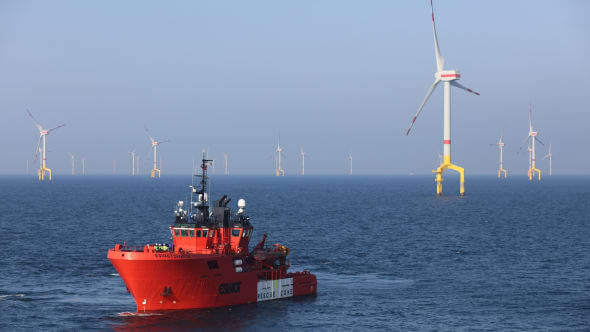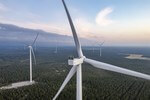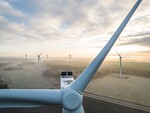News Release from windfair.net
Wind Industry Profile of
Drones and Wind Industry
“You save a great deal of time. This service is relevant for many,” says Mads Obling Rasmussen, CEO for AtSite A/S, specialists in inspection, analysis and database solutions for blades and main components for wind turbines.
The potential for drones is very large especially in the offshore sector, which is why Esvagt – known mainly for their service vessels – has now also included drone inspection in the list of services offered. Thus a drone was used to inspect rotor blades for visible damage during service works at the German BARD Offshore 1 wind farm, in addition to the 'Esvagt Champion'.
Minimize Downtime of Turbines
Such an inspection only takes 25 minutes per turbine, which results in a tremendous increase in efficiency, since the turbine has to be switched off for the period of the inspection. With the previously used method – jetting a person down on ropes on each rotor blade individually – the wind turbines had to be switched off between half a day and a whole day (depending on weather conditions).
Additional safety risks are added to the task of abseiling: the personnel transfer between vessel and TP is also dangerous, but abseiling itself is much more dangerous on sea than onshore due to heavy winds.
And drones offer an additional advantage: they can collect data on site. At the BARD wind farm, for example, photos of the substation, foundations and tower elements were made to be examined more closely.

Esvagt operates with a drone stationed on a vessel. (Photo: Visual Working)
Legal Uncertainties Prevent Extended Use
Drones could also be used onshore. However, the example of Germany shows that the legal situation has not yet been adapted to current circumstances. "We are quite concerned that technical innovations from Germany can not be further developed here, because good ideas are put to a halt by outdated laws," says Frank Lochau, Chairman of the German Drones Association (BVZD) and founder of the company ProCopter GmbH in Leipzig.
More than one million drones have been in operation in Germany alone this year, a substantial proportion of which is in commercial use. These are already more drones than airplanes today, but a legal basis for ground-level airspace management is lacking.
And this is precisely what is required as a recent study commissioned by BVZD and the Maslaton Lawyers Association at Ahnen&Enkel Research pointed out. Titled "Fly High - Market, Opportunities and Challenges of a Growing Civilian Drone Action", the study explains that Germany will have problems to stay competitive internationally, if the legal situation will not be clarified quickly. Drones will develop their considerable potential, especially if they can be used autonomously and automatically. However, the current legal situation in Germany prohibits autonomous drones.
Especially in the wind energy sector the use of drones would also be important onshore. After all, there are more than 29,000 wind turbines already installed in Germany, all of which must be inspected on a regular basis. Some service companies are already using drones, as the image above of Availon, which now a part Vestas, shows.
The whole wind sector should be supporting this innovative market and taking advantage of the possibilities offered by drones. Apart from that, it is not only the withdrawal of tech companies that are developing drones from Germany, but also the takeover of the service business from abroad.
- Author:
- Katrin Radtke
- Email:
- press@windfair.net
- Keywords:
- drones, service, vessel, O&M, onshore, offshore, Esvagt, rotor blade, turbine



























